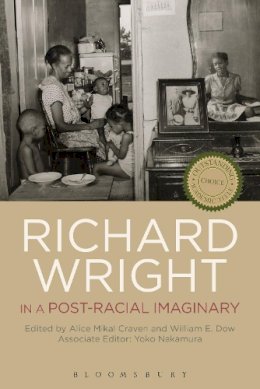
Richard Wright in a Post-Racial Imaginary
Dr. William E. Dow (Ed.)
In African American fiction, Richard Wright was one of the most significant and influential authors of the twentieth century. Richard Wright in a Post-Racial Imaginary analyses Wright's work in relation to contemporary racial and social issues, bringing voices of established and emergent Wright scholars into dialogue with each other.
The essays in this volume show how Wright's best work asks central questions about national alienation as well as about international belonging and the trans-national gaze. Race is here assumed as a superimposed category, rather than a biological reality, in keeping with recent trends in African-American studies. Wright's fiction and almost all of his non-fiction lift beyond the mainstays of African-American culture to explore the potentialities and limits of black trans-nationalism. Wright's trans-native status, his perpetual "outsidedness" mixed with the "essential humanness" of his activist and literary efforts are at the core of the innovative approaches to his work included here.
Product Details
About Dr. William E. Dow (Ed.)
Reviews for Richard Wright in a Post-Racial Imaginary
Gothic literature, proletarian and naturalist literature
and on such movements as existentialism and Marxism in order to render more palpable the lived realities of blacks in a segregated urban environment during the 1930s…Summing Up: Essential. Upper-division undergraduates through faculty.
T. L. Jackson, St. Cloud State University
CHOICE
One of the primary objectives of this volume is to stress the diversity of Richard Wright’s influences, and in this regard it can be considered a success, the multitude of essay topics reflecting the variety of Wright’s inspirations. … Its engagement with postmodern concerns of transnationalism, performativity and intertextuality make it an informed contribution to contemporary studies of Richard Wright and American Literature, and therefore, to make my own prediction, make it a lasting work of Wright criticism.
U.S. Studies Online, British Association of American Studies (reviewed by Eoin O'Callaghan, University College Cork, Ireland)
Richard Wright in a Post-Racial Imaginary makes critically important contributions to a twenty-first century study of Wright by providing a series of fresh perspectives on his published and unpublished work. Stressing Wright's ‘cultural hybridity,’ these penetrating essays lay special stress on his underappreciated later works which are centered in a ‘global humanist vision.’ Wright is thus liberated from the all-too-common view of him as a proletarian writer of the 1930s and affirms his status as a ‘major world-class writer’ who speaks powerfully to us today.
Robert Butler, Professor of English, Canisius College, USA
A long awaited reassessment of Richard Wright’s works and thought, the essays in this collection repudiate a narrow appreciation of Wright’s œuvre and open up radically new critical ventures. They celebrate Wright as a global intellectual, a transnational humanist, as they review his relation to existentialism and qualify his links to modernism. They analyze his published works—the canonical as well as the marginal—by looking at the unpublished and the censored. They recast his gender politics and locate him within a resolutely diasporic framework that embraces his later productions. Such a bold critical revision makes us read Wright with Ernest Hemingway, Victor Hugo, Cheikh Hamidou Kane, Percival Everett and Dalit writer Limbale, but also from the perspective of popular culture, the blues, haiku poetry and drama. In sum, they affirm the uncontested relevance of Wright’s contribution as a writer and a thinker beyond race and nationality.
Claudine Raynaud, Professor of American Studies, Université Paul-Valéry, Montpellier 3, France
Richard Wright in a Post-Racial Imaginary represents an unyielding collection of essays that challenges paradigmatic readings of Richard Wright's genius. This twenty-first century text asks that we re-examine Wright’s most well-known texts, proposing that some of his lesser-known and unpublished texts illuminate Wright as a more complex intellectual than previous studies explore. By placing Richard Wright in the context of twenty-first century post-racial ideology and theory, Richard Wright in a Post-Racial Imaginary raises many highly provocative questions that should certainly ignite a new dialogue around his intellectual transformation from Mississippi, Memphis, Chicago, and New York to a global arena in Mexico, Europe, Africa, and Asia.
Joyce A. Joyce, Chairperson, Department of English, Chairperson, Women’s Studies Steering Committee, College of Liberal Arts, Temple University, USA
